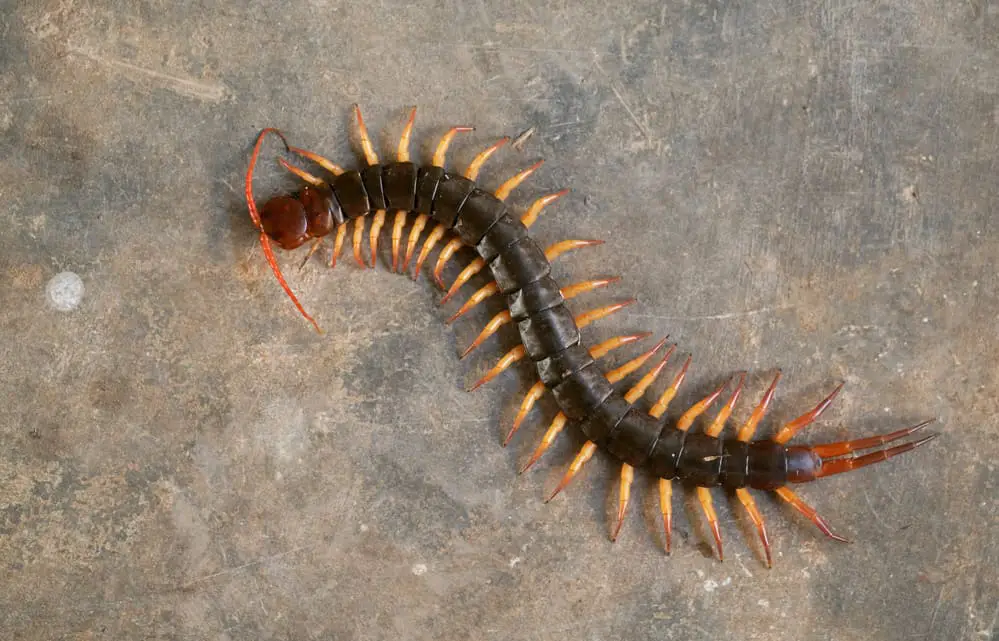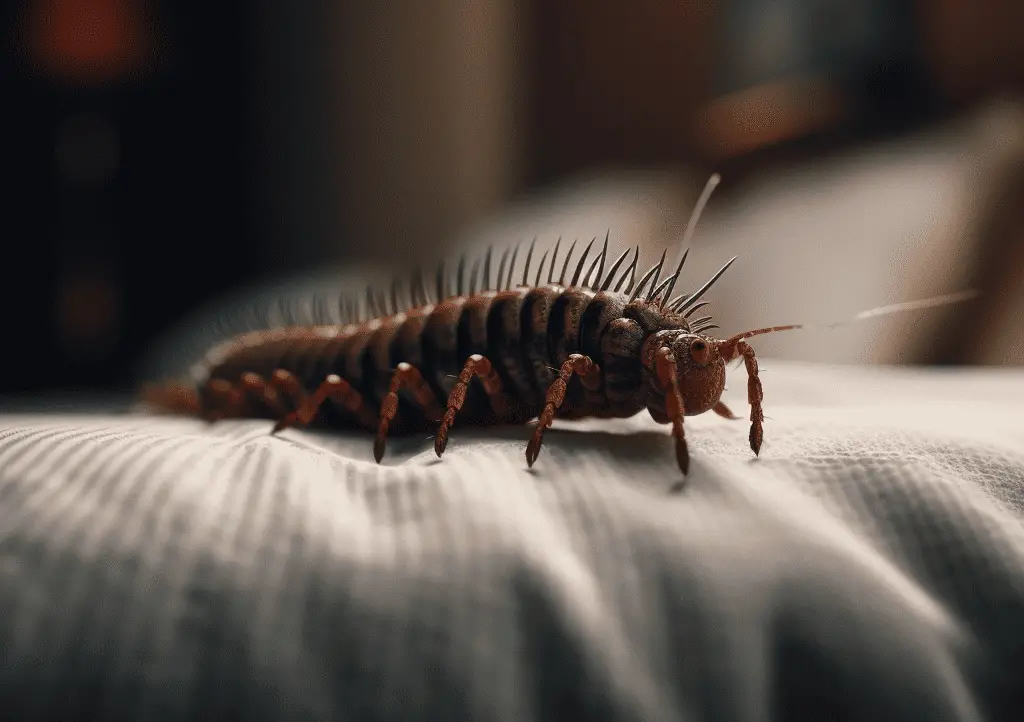Waking up to find a centipede crawling on your bed is nothing short of a nightmare for most people. These pesky critters are not only creepy but can also deliver a painful bite if you accidentally come into contact with one.
To keep centipedes at bay, it’s important to understand what attracts them in the first place. They’re usually drawn to damp, cool, and dark environments with plenty of hiding spots. So, by making your bedroom less hospitable for these arthropods, you can reduce the likelihood of sharing your bed with them.
Implementing proper prevention strategies can greatly minimize the chances of centipedes invading your bed. It’s time to take control of the situation and protect your peaceful slumber from these unwelcome guests.
Understanding Centipedes
Characteristics of House Centipedes
House centipedes are a common species of centipedes that can sometimes find their way into our homes. They have many legs, typically around 15 pairs, and are usually 1-1.5 inches long. These creatures are nocturnal, which means they are most active at night. Their brownish-yellow color usually includes dark stripes, which helps them blend in with their surroundings.
While centipedes have venomous glands, they are not dangerous to humans, as their venom is primarily used to subdue their prey. They typically feed on other insects, such as spiders, ants, and cockroaches.
How Centipedes Enter Your Home

Centipedes usually enter homes through small cracks or openings in the foundation, windows, and doors. They are attracted to damp, dark environments, such as basements and bathrooms.
To prevent centipedes from entering your home, make sure to:
- Seal any cracks or gaps around windows and doors
- Keep your home clean and clutter-free to minimize hiding spots
- Eliminate excess moisture, which can be achieved by using a dehumidifier in damp areas.
By understanding the characteristics and habits of house centipedes, you can make informed decisions regarding how to prevent them from entering your home and potentially infesting your bed. Remember, while they might look terrifying, they are not dangerous to humans and can even be beneficial when it comes to natural pest control.
Factors Attracting Centipedes to Your Bedroom
Centipedes are attracted to bedrooms for a variety of reasons, and understanding these factors can help you keep them away.
Moisture and Damp Environments
Centipedes thrive in moist and damp environments. They are more likely to enter your bedroom if it has a high level of humidity or dampness. This is because a humid environment provides centipedes with the moisture they need to survive.
Some common causes of dampness in your bedroom may be:
- Leaky pipes: Check for any leaks in your home’s plumbing and fix them promptly to discourage centipedes.
- Poor ventilation: Ensuring proper airflow can help reduce moisture levels in your bedroom. Open windows to let fresh air in and use a fan to circulate air if necessary.
- Use a dehumidifier: A dehumidifier can make your bedroom less attractive to centipedes by reducing moisture levels.
Food Source: Insects and Pests
Centipedes are predators that feed on insects and other small pests. If your bedroom has an infestation of insects or other pests, it is more likely to attract centipedes. Some common pests that may serve as a food source for centipedes include:
- Spiders: Keep your bedroom clear of spider webs and keep an eye out for any spiders.
- Ants: Seal off any entry points in your bedroom to prevent ants from entering.
- Other insects: If you notice any other insects in your bedroom, consider using natural insect repellents, sealing cracks where insects may enter, and maintaining cleanliness to deter them.
By addressing both moisture and food sources, you can create an environment that is less attractive to centipedes and reduce the likelihood of finding them in your bedroom.
Effective Ways to Keep Centipedes Out of Your Bed
Centipedes can be quite an unwelcome sight in your bedroom, especially when they find their way to your bed. Fortunately, there are several effective strategies for keeping these creepy crawlies at bay.
Cleaning and Decluttering
An essential step in keeping centipedes away from your bed is maintaining a clean and dry environment in your bedroom. Regularly vacuum your floors, paying special attention to corners and crevices where centipedes may seek shelter.
Make a habit of washing your bedding and using fans or a dehumidifier to keep the room dry. This will discourage centipedes from nesting in your space, as they prefer damp and dark areas.
Additionally, decluttering your bedroom can help remove potential hiding spots for centipedes. Keep your belongings organized and off the floor to eliminate opportunities for centipedes to take up residence. Address any moisture issues, such as leaks or dampness in your bedroom or nearby bathrooms to create an inhospitable environment for centipedes.
Sealing Entry Points and Hiding Places
Once your bedroom is clean and clutter-free, focus on sealing possible entry points and hiding places. Inspect your walls, windows, and foundation for any cracks, holes, or gaps that may allow centipedes and other pests, such as ants, roaches, or silverfish, to enter.
- SEALS OUT WATER, AIR AND MOISTURE: Gorilla Waterproof Caulk & Seal 100% Silicone Sealant* seals out water, air and moisture and is great for kitchen, bath, window, doors, auto, marine, plumbing,…
- 30 MINUTE WATER READY: Can be exposed to water in as little as 30 minutes based on a 3/16” bead at 70°F (21°C) and 50% humidity. Otherwise, wait 24 hrs.
- MOLD & MILDEW RESISTANT: This long lasting sealant is not only mold & mildew resistant, but won’t yellow, shrink or crack over time!
Use caulk to seal gaps or holes, paying special attention to areas near warmth and light sources, which might attract bugs.
Take the time to clean gutters and check your yard for standing water that can attract insects and centipedes in search of a moist environment. Regularly clean your basements and check for any moisture problems that need to be addressed. Make sure window sills are free of debris and small gaps are sealed to prevent insects from entering your living space.
Although insecticides can be helpful in dealing with centipedes, they should be used as a last resort, considering the potential harm to humans and other living organisms. Sticky traps or natural deterrents like peppermint or mothballs can also be effective yet less harmful ways to keep centipedes at bay.
Natural Repellents and Barriers
Using Essential Oils
Essential oils are a popular natural repellent for centipedes. Peppermint oil is known for its strong, pleasant aroma, which is overwhelming for these pests.
To use it as a repellent, simply mix a few drops with water and spray it around your bed frame and baseboards. Similarly, tea tree oil is another effective essential oil against centipedes. You can use the same method as with peppermint oil for spraying around your bed and other hiding places like dark spots and damp corners.
Another option is to use cayenne pepper as a deterrent. Sprinkle it around your bed or affected areas to make the environment unfavorable for centipedes.
Creating Physical Barriers
To prevent centipedes from accessing your bed, you can create physical barriers. Start by sealing cracks and gaps around your room, including baseboards and door frames, using a sealant. This will minimize the entry points for centipedes into your living space.
One of the primary reasons centipedes enter your home is a source of food. Common food sources for centipedes include worms, moths, flies, and other small insects. Make sure to keep your property clean and free from these delicious meals. Be sure to regularly dispose of leaves and plants in your surroundings that might harbor such insects.
Another factor attracting centipedes is dampness and dark spots in your living area. These creatures thrive in moist environments, so a good preventative measure is to use a bathroom fan or air dehumidifier in your room to maintain a low humidity level.
Additionally, try to keep your bed and the room well-lit in order to discourage centipedes from finding refuge in your space.
Using proper pest control service and maintaining cleanliness can go a long way in keeping centipedes away from your bed. In case you still notice centipedes around your room, consider using a centipede trap to catch them.



